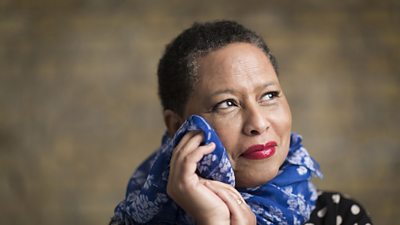BBC Radio 3 presents A History Of Black Classical Music, celebrating black classical composers
BBC Radio 3 announces a three-part series with composer Eleanor Alberga (pictured) which will bring to the fore the contribution of black composers to the history of Western classical music.

Researching this series has taken me on a revelatory world tour from the 16th to the 21st centuries… I feel privileged to resurrect such long-silent treasures of black classical creativity and to reaffirm the contribution of recent multicultural composers.
BBC Radio 3 celebrates the impact of black composers on the history of Western classical music with three hour-long episodes, part of A History Of Black Classical Music, debuting on the station’s airwaves on Sunday 10 May at 11pm.
Presented by acclaimed Jamaican-born, UK-based composer Eleanor Alberga, the series foregrounds often forgotten figures, highlights the influence musical traditions such as the spirituals have had on Western composers, and overall charts the history of black people, their heritage, and their impact on the wider cultural life in Europe and America.
The exploration starts in the 16th Century with a focus on John Blanke, the then celebrated court trumpeter to Henry VIII, who was commissioned to write a piece marking the birth of the king’s son in 1511. It proceeds to showcase black composers through 18th and 19th century Europe and America, with figures such as Ignatius Sancho, the Chevalier de Maude-Monpas, and 'Creole Romantics' such as Lucièn Lambert and Edmond Dedé.
Dvořák’s fascination with spirituals, the 'Northern Migration' and the Harlem Renaissance provide a canvas for an exploration of music by American composers such as William Devi-Lawson, Margaret Bonds, Florence Price, and Lawrence Freeman, all the way to Adolphus Hailstork, George Walker, Julius Eastman and Jonathan Bailey Holland.
The impact of colonialism and immigration is highlighted in the third programme, with a particular attention to the UK and how Western classical music was adopted by different peoples as a means of expression to make their own, with music by Samuel Coleridge-Taylor, Abu Bakr Khairat, Ludovic Lamothe and Oswald Russell. The series ends with a showcase of contemporary British composers such as Shirley J Thompson, Errollyn Wallen, Hannah Kendall, Daniel Kidane and Eleanor Alberga herself, as well as a brief look at composers with links to India, the Middle-East and Asia.
Eleanor Alberga says: “Researching this series has taken me on a revelatory world tour from the 16th to the 21st centuries. With equal measures of upset and delight, this panorama has made me feel privileged to resurrect such long-silent treasures of black classical creativity and to reaffirm the contribution of recent multicultural composers.”
Alan Davey, BBC Radio 3 and Classical Music Controller, says: “Delving into the History of Black Classical Music is an important subject and an important conversation for the sector to have.
"At Radio 3 we have been committed to shining a light on unfairly forgotten areas of Western classical music for some time, but this series in particular will go more in depth, looking at the links between history and music, with proper tribute and acknowledgment, ensuring audiences are aware of some of the great figures in classical music who have contributed so much over the years but have often been overlooked.
"I’m particularly honoured that Eleanor, a brilliant composer practising today, will be joining BBC Radio 3 as a presenter, acting as our guide for this series and taking audiences on a journey which will take us through to some exciting composers creating music today.”
Listeners will have further opportunities to hear music presented in the series across BBC Radio 3 schedules from Sunday 10 May. Works included in the three episodes will be also part of Breakfast and Essential Classics mainly, with contributions on Record Review, Early Music Show and New Music Show. The series will also be available on BBC Sounds.
EC
A History Of Black Classical Music
Sunday 10 May, 11pm
The Blacke Trumpeter
Eleanor begins her journey with story of John Blanke, a celebrated court trumpeter to Henry VIII, who appears as 'the blacke trumpeter' on the Westminster Tournament Roll, commissioned by the king to mark the birth of his son, Henry, in 1511.
The programme considers the presence and position of black people within the European population since that time. She features the music of black composers in England and France from the 18th century, including Ignatius Sancho, JJO de Meude-Monpas and Joseph Boulogne, before crossing the Atlantic to the Southern States of America, to New Orleans, and the music of the 'Creole Romantics' - musicians like Lucien-Léon Guillaume Lambert and Edmond Dédé.
This first programme ends with Eleanor considering the impact that Dvorak’s historic visit to America made to black composers in the 1890s.
- Producer: Chris Wines
A Great And Noble Music
Sunday 17 May, 11pm
In the second programme of this series, the focus is America, and how “black pride and identity” have helped to shape American classical music from the turn of the 20th Century to the present day.
In the early 1890s, Antonin Dvorak was invited to the country to help establish an American national music, and there were several black classical composers, such as William Levi Dawson, who emerged at this time, and whose music is often characterised by the use of spirituals.
Eleanor then continues her story with a look at the impact on American culture of the ‘Northern Migration’ of black people from the south and the emergence of the Harlem Renaissance, with music by Lawrence Freeman, William Grant Still, Margaret Bonds, Julia Perry and Margaret Price.
In the last section of the episode, Eleanor explores contrasting examples of American classical music from composers such as Adolphus Hailstork, Ulysses Kay, George Walker, Julius Eastman, Jeffrey Mumford and Jonathan Bailey Holland.
Mother Country
Sunday 24 May, 11pm
In the final part of this series Eleanor Alberga touches on the impact of colonialism and immigration on classical music, and considers the history of black composers in the UK.
European imperialism afforded huge cultural influences on great swathes of the world, and as a result western classical music was often enthusiastically adopted by different peoples as a means of expression to make their own. Black composers emerged from colonies in Africa, the Caribbean and beyond.
This programme begins with music by Samuel Coleridge-Taylor, who was born in London, but whose father was from Sierra Leone. It foregrounds the music of composers such as Fela Sowade from Nigeria and Abu Bakr Khairat from Eygypt. From the area around the Caribbean we have music by Ludovic Lamothe and Oswald Russell, and also from a new generation of composers, living in the UK, but with roots in the Caribbean.
